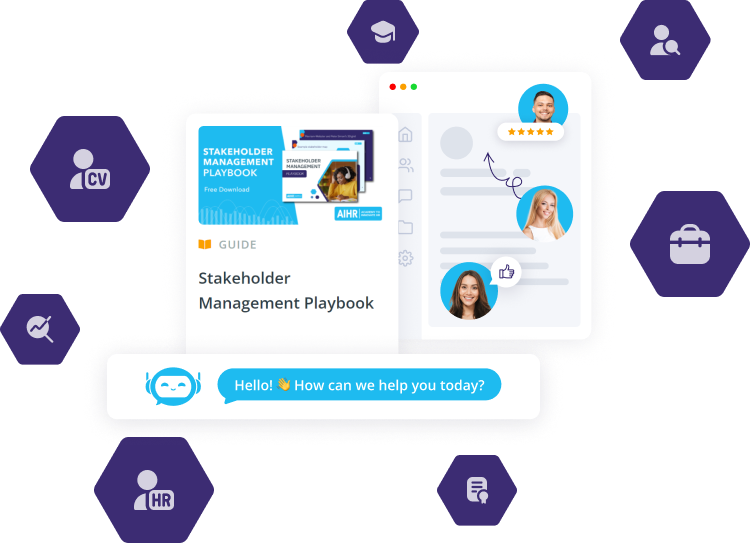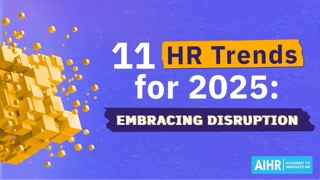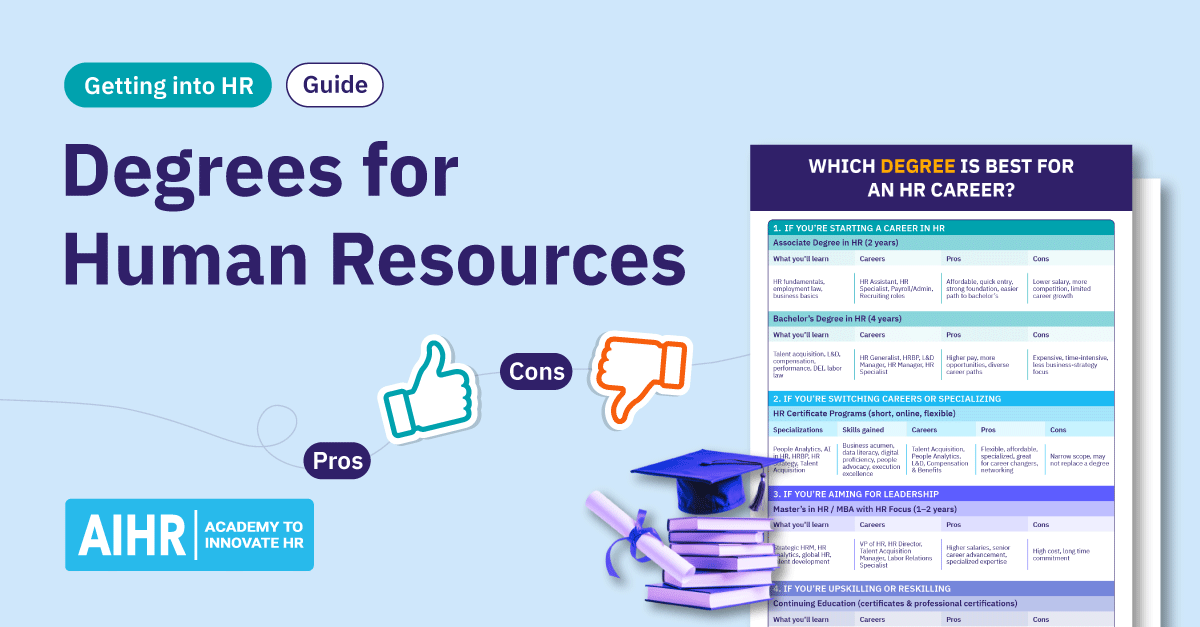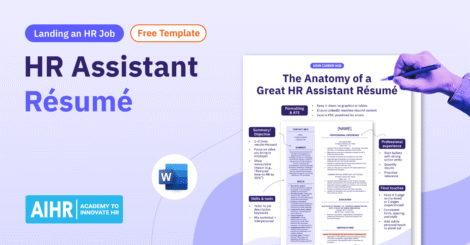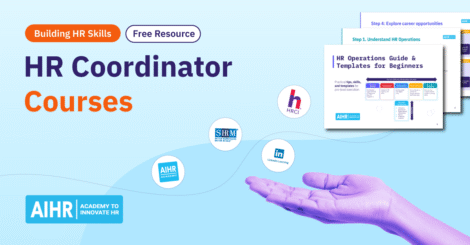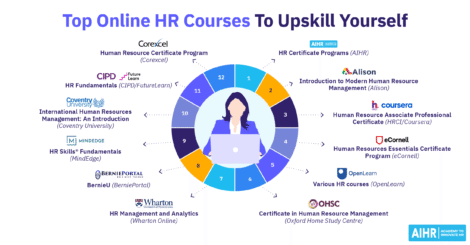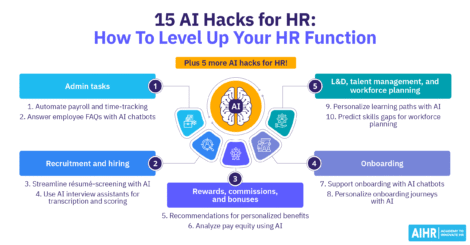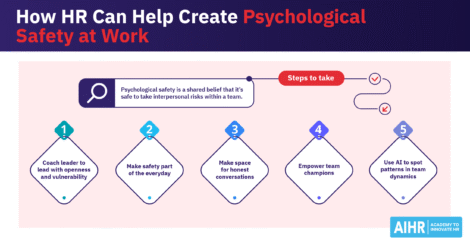Thinking about a career in Human Resources? Whether you’re just starting out or transitioning from another role, choosing the right degree for Human Resources can shape your entire career path. While you don’t always need an HR degree to land a job in the field, having one can give you a strong foundation, boost your credibility, and open doors to better opportunities.
In this guide, you’ll learn everything you need to know about the different degrees for Human Resources, what skills they offer, the career paths they lead to, and how to decide which one fits your goals and lifestyle.
Contents
Do you really need a degree to work in HR?
Common Human Resources education requirements
Which degree is best for an HR career?
How do you choose the right HR degree?
What is the best HR qualification?
FAQ
Do you really need a degree to work in HR?
The short answer? Not always. People often build a successful HR career without a formal HR degree.
However, many entry-level HR jobs still require at least a bachelor’s degree. And if you’re new to HR, having a degree—especially one focused on HR or business—can make you a more attractive candidate and give you confidence starting out.
Common Human Resources education requirements
While there are no official education requirements for people who want to work in HR, there are some common qualifications that regularly pop up on job adverts for HR professionals, including:
- Bachelor’s degree in Human Resources, Organizational Psychology, Business, or a related field for entry and mid-level roles.
- Master’s degree in HR or an MBA with an HR focus for senior roles.
- HR certifications like SHRM-CP, SPHR, or AIHR certificates for specialized or strategic positions.
Advance your HR career with Full Academy Access
From skills development to practical resources, AIHR’s Full Academy Access gives you the complete toolkit to grow, lead, and thrive in HR.
✅ Learn from unlimited certificate programs and new monthly courses
✅ Download and apply 500+ templates, toolkits, and playbooks instantly
✅ Accelerate your career with assessments, coaching, and career mapping
✅ Stay connected through live events, peer networking, and AIHR Copilot.
🎓 Make your HR career unstoppable with the most comprehensive HR membership available.
Which degree is best for an HR career?
There’s no one-size-fits-all answer. The right Human Resources degree depends on where you are in your career, your budget, and your future goals. There’s no one-size-fits-all answer. The right Human Resources degree depends on where you are in your career, your budget, and your future goals.
If you’re starting a career in HR, an associate or bachelor’s degree is usually the best place to begin. These programs provide the foundation you need in HR fundamentals, business operations, and communication skills to land your first role and grow from there.
1. Associate degrees in Human Resources
An associate degree in Human Resources provides an introduction to the ethics, legal issues, and core business administration theories you need to succeed in an entry-level HR role.
The two-year curriculum of an associate degree program is the equivalent of the first two years of a bachelor’s degree. It gives students the knowledge they need to specialize in HR roles, such as benefits, hiring, recruitment, and L&D.
Example associate’s degrees in Human Resources
- Ashworth College: Associate Degree in Human Resources
- Northeast Wisconsin Technical College: Human Resources: Associate Degree
- Bryant & Stratton College: Human Resources Specialist Associate Degree
- Penn State University: Labor and HR Associate Degree.
Skills you’ll gain
- HR fundamentals (HR management, employment law, benefits, etc.)
- Basic business operations and communication
HR career paths with an associate degree
An associate degree in Human Resources enables you to pursue:
- An entry-level position as an:
- HR Assistant
- HR Specialist
- Payroll Administrator
- Or a position as a:
- Hiring Associate
- Recruiting Associate
- Or gain experience, continue with a bachelor’s degree for more advanced roles, or grow into a management role.
There are, however, many options in terms of HR careers you can pursue. Check out our HR Career Map to understand what yours could look like.
Pros and cons
As with everything, there are some benefits and drawbacks related to an associate degree in HR. Some elements to consider in that regard are:
Pros:
- Lower costs: Earning an associate degree in HR is generally more affordable than getting a bachelor’s degree, making it a more budget-friendly option.
- Good for entry-level positions: An associate degree can help you qualify for and land entry-level roles in HR.
- Builds a strong foundation: The curriculum covers key HR knowledge and skills, giving you a solid starting point in the field.
- Easier path to further education: If you choose to pursue a bachelor’s degree later, an associate degree often allows you to complete the program in two years instead of four.
Cons:
- Lower earning potential: Those with an associate degree may earn less than individuals with a bachelor’s degree or higher.
- Increased competition: There may be more competition for entry-level roles, as some employers prioritize candidates with bachelor’s degrees.
- Limits on career growth: Career advancement into senior or managerial positions may require a bachelor’s degree, meaning additional qualifications could be needed down the road.
2. Bachelor’s Degree in HR
A bachelor’s in HR is one of the most common ways to break into the field. This 4-year degree equips you with a broader and deeper understanding of how to manage people, improve performance, and support business goals.
Example bachelor’s degrees in Human Resources
- University of Maryland Global Campus: Online Bachelor’s Degree: Human Resource Management
- Grand Canyon University: Bachelor’s Degree in Human Resources Management
Bachelor of Human Resources and Labor Relations: Athabasca University - Ottawa University: Online Bachelor of Arts in Human Resources
Topics that are typically covered in an HR Bachelor’s degree program are:
- HR fundamentals: Human Resources Management, including Talent Acquisition, Training and Development, Compensation and Rewards, Performance Management, Global HRM, and Labor Laws.
- Special topics in HRM: Building effective teams, leadership development and skills, ethics and HRM, diversity and inclusion, conflict management, and more.
HR career paths with a bachelor’s degree
A bachelor’s degree in Human Resources enables you to pursue a career as:
- A Human Resources Manager
- A Learning and Development Manager
- An HR Business Partner
- An HR Generalist
- A Human Resources Specialist.
These are just a few options when you acquire a bachelor’s degree; your HR career can take many shapes based on your aspirations, experience, and circumstances.
Pros and cons
Let’s take a look at some of the benefits and potential drawbacks of a bachelor’s degree in Human Resources:
Pros
- Higher earning potential: HR professionals with a bachelor’s degree often earn more compared to those with an associate degree.
- More job opportunities: A bachelor’s degree can open up more entry-level and even advanced roles in HR, giving you an edge in a competitive job market.
- Variety of career paths: With a bachelor’s in HR, you can pursue diverse roles such as HR Generalist, HRBP, Talent Acquisition Specialist, L&D Manager, and more.
Cons
- Significant investment: Earning a bachelor’s degree requires a lot of time and money. These programs typically take four years to complete and can cost tens of thousands of dollars.
- Limited focus on business skills: While most HR programs include some business-related modules, critics argue that HR professionals need a stronger grasp of business principles, communication, and strategy. They suggest combining a business degree with additional HR certifications for a more well-rounded skill set.
If you’re switching careers or looking to specialize, certificate programs can be a smart option. They’re often shorter, more affordable, and focused on specific areas like people analytics, recruitment, or HR strategy, making them ideal for building targeted skills quickly.
3. Specialized Human Resources certificate programs
If you’re switching careers into HR or want to build specialized skills, certificate programs can help you upskill fast. These are often short, online programs that focus on specific areas like people analytics, recruitment, or HR strategy.
Examples of popular AIHR Certificate Programs
- AIHR People Analytics Certificate Program
- Learn how analytics in HR can be used to drive business value
- Analyze people data in Excel to become hands-on
- Learn how to build interactive HR dashboards and reports with Power BI.
- AIHR HR Manager Certificate Program
- Get a thorough understanding of business, HR operating models, and organizational design.
- Drive change, get buy-in, build trust, and become a culture champion.
- Learn how to align HR strategies with business goals and how to implement an agile, project-based approach to HR.
- AIHR Artificial Intelligence for HR Certificate Program
Gain an understanding of the AI landscape and how to effectively leverage AI in HR.- Master the use of generative AI in HR.
- Develop and implement an AI strategy that creates business success.
- AIHR HR Business Partner 2.0 Certificate Program
- Increase your business acumen and identify strategic challenges.
- Gain key consulting skills such as storytelling, analysis, presenting, and networking.
- Learn how to apply employee experience techniques and develop data literacy skills.
Skills you’ll gain
The skills you develop in an AIHR certificate program depend on the course you choose. However, the programs are generally designed to help you become a T-shaped HR professional and focus on building the following key skills:
- Business acumen: Business acumen is the ability to understand a company’s purpose, goals, and vision, and create activities, policies, and processes that align with them.
- Data literacy: Data literacy means being able to critically analyze data, extract meaningful insights, and apply it effectively to specific needs.
- Digital proficiency: Digital proficiency is the ability to use technology to improve HR efficiency and drive business growth and value.
- People advocacy: People advocacy is about championing employees and fostering a positive organizational culture. It involves helping people reach their potential and ensuring strong communication.
- Execution excellence: Execution excellence focuses on how HR teams effectively execute their responsibilities, ensuring HR delivers value to all stakeholders.
Each of these skills is essential for HR professionals looking to make a meaningful impact in their organizations.
HR career paths with a certificate program
Completing an HR certificate program and earning a certification can help you build a career in various HR functions, such as talent acquisition, people analytics, learning and development, or compensation and benefits.
Pros and cons
HR certificate programs come with their benefits and drawbacks. Here’s a breakdown:
Pros
- Flexibility: Certificate programs are more flexible than associate or bachelor’s degrees in HR. They are often online and self-paced, making them easier to fit into your schedule.
- Affordable: These programs are typically much more affordable than most degree programs.
- Specialized knowledge: Certificate programs focus on specific areas of HR, like talent acquisition or people analytics, allowing for in-depth learning in a particular domain.
- Great for career switchers: For those without an HR background, these programs provide essential knowledge and skills to transition into the field.
- Networking opportunities: At AIHR, students join the AIHR Community, where they can connect, ask questions, and share ideas with peers worldwide.
Cons
- Limited scope: Since certificate programs focus on one topic, they may not provide a broad understanding of the HR field.
- May not be enough: Some employers still require a degree, so an HR certificate alone might not meet all job qualifications.
Continuing education opportunities
According to the AIHR State of HR report, 11% of HR professionals move in and out of the field during their careers.
Most of these individuals already have transferable skills or hold a degree relevant to HR. For those looking to enhance their knowledge, certificate programs or continuing education can be excellent options to prepare for (re)entering HR and developing essential skills.
Examples of relevant programs include AIHR’s HR Manager and HRBP 2.0 Certificate Programs, as well as professional certifications like SHRM-CP or HRCI’s PHR.
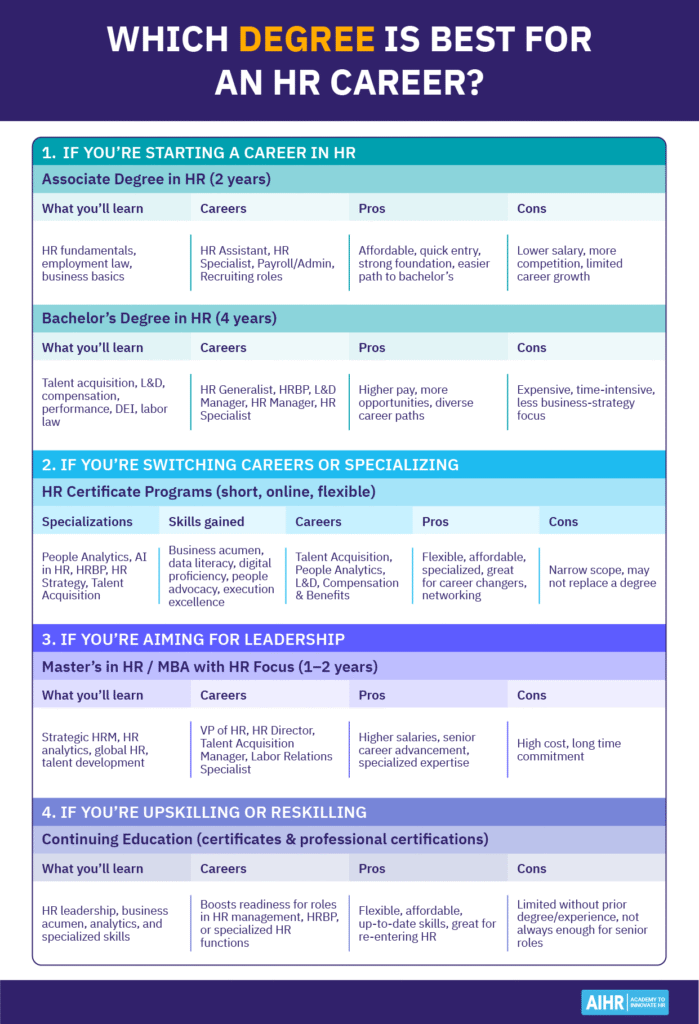
4. Master’s degree in HR or MBA with an HR focus
If you’re aiming for a leadership or strategic role, pursuing a master’s degree in Human Resources or an MBA with an HR focus is a great way to deepen your expertise while transitioning into the field. A master’s degree typically takes 1-2 years for full-time students or 2-5 years for part-time students.
Examples of Master Degree Programs for HR
- Western Governors University: Human Resource Management Master’s Degree
- USC Online: Master of Science in Human Resource Management
- York University: Master of Human Resource Management
Skills you’ll gain
Common topics covered in HR master’s programs include:
- Strategic Human Capital Management
- HR Analytics and Technology
- Talent Development
- Global HR Practices.
HR career paths with a master’s degree
A master’s degree in HR enables you to pursue a career as:
- A VP of HR
- An HR Director
- A Talent Acquisition Manager
- A Labor Relations Specialist
- And many other things.
Pros and cons
Choosing to obtain a master’s in HR has similar pros and cons to the ones we’ve seen earlier:
Pros
- Higher earning potential: A master’s degree often leads to higher salaries since it qualifies you for more senior positions.
- Specialized knowledge and skills: A master’s program provides expertise in areas like HR tech, analytics, talent acquisition, and labor law.
- Career advancement: For those with experience in related fields, a master’s can help you transition into senior HR roles with the right knowledge and skills.
Cons
- High cost: The price of a master’s program can be steep, often running into tens of thousands of dollars.
- Time commitment: Completing a master’s takes at least one or two years, and balancing coursework with work or personal life can be challenging.
HR master’s degree fast fact
57% of HR leaders have a master’s degree or higher.
How do you choose the right HR degree?
There are many types of degrees available for Human Resources, so choosing the right one depends on a few key factors:
- Time: How much time can you dedicate to your studies? If you’re a full-time student, you might have more flexibility compared to someone working full-time or managing family responsibilities.
- Budget: What’s your budget? Are you open to taking out a loan to pay for your degree? If you’re employed, would your company be willing to cover part of the cost for your HR education?
- Career goals: Are you just starting your career and exploring HR, or are you an experienced professional looking to transition into the field? Your career aspirations, including your target role and salary, will influence the type of HR degree that’s best for you.
What is the best HR qualification?
There isn’t one “best” HR qualification—it depends on your time, budget, career goals, and what the job market demands. For instance, if employers are looking for candidates with a bachelor’s or master’s degree in HR, completing a certificate program may not be enough.
If you’ve spent years in another field, such as Finance, and want to transition into HR for a role like HR Director, an HR Manager Certificate might be your best option. Ultimately, the right qualification depends on your unique situation and market conditions.
To sum up
There are plenty of HR degree options available, catering to everyone from entry-level professionals starting their careers to experienced individuals aiming for senior HR roles. Whatever your goals, there’s a program to match your needs.
FAQ
There are no official degree requirements to work in HR. However, many companies prefer candidates with an Associate’s or Bachelor’s degree in Human Resources to qualify for HR roles.
Yes, it’s possible to work in HR without a degree. Here’s how:
1. Gain relevant HR experience
2. Complete accredited HR certificate programs
3. Prepare for the certification test
4. Apply for the HR certification exam.
What you need to start a career in Human Resources depends on your situation and the job market. For example, if you’re just starting out, an Associate’s degree and applying for entry-level positions may be enough.


